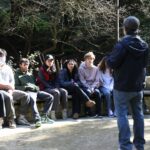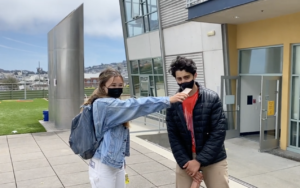Defund the police. Abolish the police. Police reform. These terms have been commonly used in recent months, often interchangeably, in protests against police brutality. But, while these terms accurately capture the aims of a movement, what does a world without police truly look like?
During the annual Sam Mihara Days of Justice, LWHS hosted several virtual workshops that educated students on a variety of topics such as restorative justice, microaggressions and mass imprisonment.
“A World Without Police,” one of the workshops, was led by Ben Cohn ’06, a former associate in the LWHS Center for Civic Engagement. At LWHS, he led anti-racist education work, designed curriculum for workshops and organized social justice events for the community. Cohn was appointed a Fulbright fellow, and lived in Ghana, exploring the country’s rich music and culture. He is a recent graduate of American University’s Justice, Law and Criminology MS program.
Cohn, in his Sam Mihara Day workshop, wanted attendees to “discuss the history of the call for police abolition, try to imagine a world where communities are able to keep themselves safe and create strategies that can be used today instead of relying on 9-1-1.”
Journey Moore-Prewitt ’21 chose to attend the workshop because, in recent months, police abolition “was something that was being talked about widely, especially on social media, and by a lot of people who don’t actually know what it means to abolish police.”
Cohn started the workshop by asking attendees what their initial impressions were when they heard the phrases “defund the police” or “police abolition.” While both defunding and abolition aim to reform the police, defunding means redistributing funds to other service providers while abolition means getting rid of the police altogether and creating alternatives. Like most others on the Zoom call, Leo Saunders ’24 and Sophie Merickel ’24 thought defunding and abolition meant “moving money and resources away from punishment and into communities to address underlying issues.”
Cohn then played a video from Project NIA, an advocacy organization that, according to its website, “works to end the incarceration of children and young adults by promoting restorative and transformative justice practices.” Project NIA advocates utilizing community-based safety responses rather than relying on the prison system.
The video detailed how, in the organization’s view, law enforcement has always been a problematic institution rooted in white supremacy. Police were first implemented in the United States in the 1700s to catch and return runaway enslaved people. They were also used to stop labor strikes and riots against the rich and restrict Native people from entering cities occupied by white settlers.
Katrina Pehling ’23 attended the World Without Police workshop. As a leader of Fostering Activists in the Next Generation (FANG), Pehling organized a virtual police abolition teach-in with Defund SFPD. “I am an abolitionist. I don’t think the police can be reformed because, at its core, it’s racist and classist,” said Pehling. “There will always be that history, and I think that they will always be acting in the interests of the ruling class.”
Moore-Prewitt echoed Pehling’s point. “The police have technically been reforming for 400 years. They’ve been reforming from slave patrols into what they are now,” said Moore-Prewitt. “How can you say a structure that was built on the brutalization of Black people will keep Black people safe?”
Defunding or abolishing the police means lessening or eliminating the influence of police in society, recognizing that they do not prevent harm and aren’t the solution to social problems. More than half of the time, police are responding to non-criminal and traffic calls. Only one to three percent of police responses are related to violent crime, according to Project NIA. And, police often do not prevent violence. When called, they are responding to violence with another threat of violence. Communities of color in particular often view police as perpetrators of violence because of the long history of racism and abuse of BIPOC communities in American law enforcement. Across the United States, 100 billion dollars is spent on police departments every year. With defunding or abolition, these billions can be reinvested into communities for community health and improved lives — for housing, healthcare, education and other community services.
Another aspect of the workshop was an activity that asked attendees to visualize what safety meant to them — maybe a specific environment or group of people. When asked if police were a part of their visualization, all the attendees gave a thumbs down.
Police “aren’t preventing anything, they’re not creating any kind of sense of safety, which I think are two very compelling arguments that I hadn’t really thought of before,” said Pehling.
One of the highlights of the workshop for Moore-Prewitt was when Cohn presented successful police abolition in other countries, such as in Mexico and Syria. “Knowing that there are places that have abolished police is nice to see because, for me, and a lot of my peers who are impacted by policing, that is the end goal,” Moore-Prewitt said. “It’s nice to see that it is attainable.”
So, what can LWHS do to support a world without police?
“I’m really impressed that [LWHS] strives to include restorative justice in our disciplinary action and resolving of conflict,” said Pehling. “It’s freeing the community from the expectations and the restrictions of the carceral system.” The LWHS Restorative Justice Practices Team has been training FacStaff on how to integrate restorative practices in the classroom and working with students to implement restorative justice practices into the school’s handbook policies. Restorative justice is an alternative to traditional punishment that prevents and repairs harm by focusing on reconciliation and conversation between aggressors and victims.
Moore-Prewitt thinks that LWHS should reconsider the businesses and companies they support and their histories. “There should be more energy going towards the Restorative Justice Practices Team and restorative justice at Lick in general,” said Moore-Prewitt. “I don’t know how much funding they’re getting, but it feels like the school should be backing them so much more. They stand for everything Lick says they stand for.”







